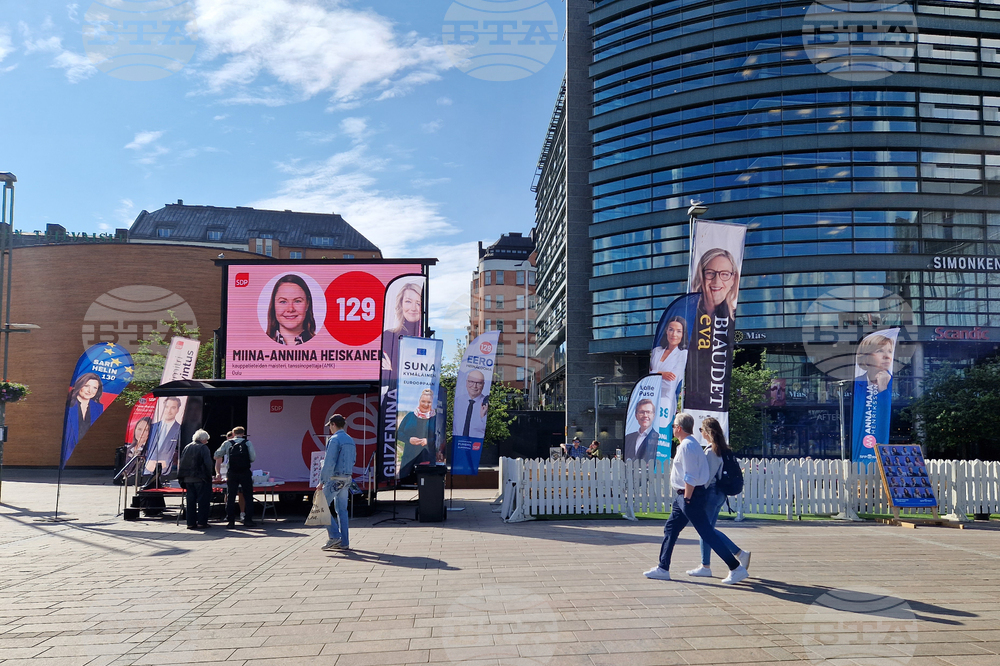site.btaFor Finns, EP Elections Are Not That Popular, EU Does Not Come Close to People's Everyday Life, Political Scientist Says


Certain factors, such as the heavy rain that poured down on Finland during the European elections on June 9 and the start of the holiday period for many families as schools are already on summer break, contributed to the low turnout in the European elections. The main reason, however, is that the EP elections are not that popular: the EU exists somewhere far away and does not come close to the everyday lives of people, Theodora Helimäki , a Bulgarian PhD researcher at the Faculty of Political Science at the University of Helsinki, said in a BTA interview post elections. The institutions and functions of the Parliament and the EU are complex and even incomprehensible to citizens, she added.
She has lived in Finland for 13 years, and one of her research topics is political behaviour in contemporary Finland, where she looks at voting and campaigning in a candidate-oriented political system.
She explained that early voting has gained popularity in recent elections, so it is not unusual for most voters to vote this way. “Especially in less populated areas, people vote early because it is more convenient. Many people who live in sparsely populated areas need help getting to a polling station. Sometimes there is transport to some polling stations organized by shops where polling stations are located," says Helimäki .
Finland held European elections for the seventh time. Early voting took place from May 29 to June 4, followed by the election day itself on 9 June. More voters went to vote early.
According to the final results announced by the Finnish Ministry of Justice on June 12, the National Coalition Party, which was the favourite in the polls, won the elections. Runner-up is the Union of the Left with 17.3%, beating the predictions of many analysts. The Social Democratic Party with 14.9%, the Centre Party with 11.8% and the Greens with 11.3% rounded out the top five.
The other two Finnish parties that will elect representatives to the EP are the Finns Party (7.6%) - the second largest party in the parliament in Helsinki, and the Swedish People's Party of Finland (6.2%).
The unexpectedly high result of the Left Alliance, the big surprise of this election, is due to the popularity of the party's leader Li Andersson, who received 247,604 votes. In Finland you vote for a candidate, not a party, explained Theodora Helimäki.
Andersson set a record for the most votes received in a European election and his success brought 3 seats in the EP to the Left Alliance. Polls failed to register her personal popularity. She was among the candidates in this year's presidential elections and has gained popularity, Theodora said.
In early 2024, Finland had presidential elections, which were won by centre-right Alexander Stubb of the National Coalition Party.
The current high result of the Left bodes well for Li Andersson, the Bulgarian researcher believes.
Helimäki explained why the eurosceptic The Finns underperformed: their voters generally do not vote if the election is not relevant for them, meaning in this case a lot of their voters stayed home. The Finns Party are part of the government in the current Parliament, which recently raised VAT by a percentage point and cut a number of social benefits. Voters are not particularly happy with the recent budget changes, the analyst said.
Asked whether the new Finnish representatives in the European Parliament should be expected to pursue different policies from the current ones on European level, she said that Finnish MEPs are relatively neutral and will likely remain so in the future. "Of course, now we have more representatives from the Left, so there the Finnish contribution will be greater than of the Right."
She points out that, curiously, Finland, just like the other Nordic countries would not be sending any far-right members, and the majority would be from the Left, as well as Greens.
Finns are positive about the European Union and do not expect many changes. The country's long-standing membership has contributed to a certain security, but alongside the crises there is also scepticism when it comes to new members joining, said Helimäki.
She believes that the EU is a more polarizing topic in Bulgaria. “In Finland, elections, campaigns and discussions are more moderate, some would even say boring,” the Bulgarian concludes.
/NF/
news.modal.header
news.modal.text